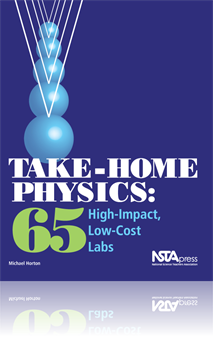All Book Chapters
Book Chapter
This inquiry activity should be used before students learn about velocity and distance versus time graphs. Students will discover how the slope of a distance versus time graph is related to the speed of the object....
Book Chapter
Although this lab is not an inquiry activity, it is very important in learning about acceleration and mass. It is a deeply held misconception among students that objects of different masses fall at different rates. Simply explaining that this is not ...
Book Chapter
This lab is an inquiry activity to be used before discussing inertia. Out of necessity to explain the observation, a short discussion of inertia is included, but teachers should certainly spend more time making this concept concrete. The activity wil...
Book Chapter
This lab introduces students to the idea of recoil and how conservation of momentum can be used to explain it. Many people use action/reaction to explain recoil, but conservation of momentum can be used equally well. Before shooting a gun, there is z...
Book Chapter
This inquiry activity should be performed after students have learned about momentum, but before they learn about conservation of momentum. Students will discover that when two objects push off each other, the momentum must be equal but in opposite d...
Book Chapter
This inquiry activity is performed by students after they learn about momentum and energy, but before they discuss conservation of momentum or energy. If students have never seen a Newton’s Cradle before, put one on your desk a week before this act...
Book Chapter
This inquiry activity should be completed before discussing with students that a projectile’s motion in the vertical direction is independent of its motion in the horizontal direction. As long as students use their apparatus carefully and don’t f...
Book Chapter
This inquiry activity should be done before students have studied the operation of a first-class lever. The activity could be used when discussing simple machines or torque. Although it involves the use of a lever, the activity is not really about si...
Book Chapter
This is an inquiry activity in which students discover what a radian is. Some students may already know how many degrees are in a radian or how many radians are in a circle, but they rarely know the definition of a radian. Knowing the definition will...
Book Chapter
This lab is an inquiry activity in that students will likely not know which direction the marble will travel and will discover it with some guidance. It also reinforces the method of preparing a hypothesis before performing an inquiry activity. Altho...
Book Chapter
This lab is purely a thought experiment. Although students are given an introduction to angular speed and tangential speed, they will discover the relationship between the two in this activity. The lab is an inquiry activity in that students do not k...
Book Chapter
This inquiry activity should be performed before students have learned about acceleration but after they have learned about speed. Students should have already completed distance versus time graphs for objects traveling at constant speed (see Lab 1)....
Book Chapter
This inquiry activity is intended to be an introduction to moment of inertia beyond just mathematical calculations. It provides some background in moment of inertia and allows students to discover that the distribution of mass in the object affects i...
Book Chapter
Although not inquiry, this activity is important for students to understand what an ellipse is and what a focus is, and to break misconceptions about Earth’s orbit being highly elliptical. This is the perfect place to check to see if students have ...
Book Chapter
This lab is an inquiry activity in that students do not know the answer and have probably never experienced this phenomenon. Most students have seen that water in U-tubes is always equal height on both sides. This lab will be both a discrepant event ...


